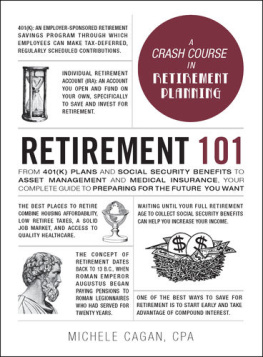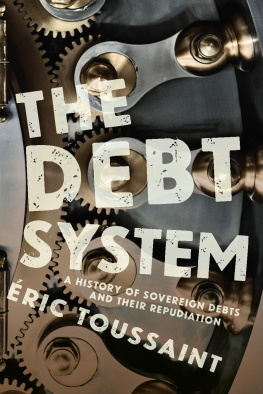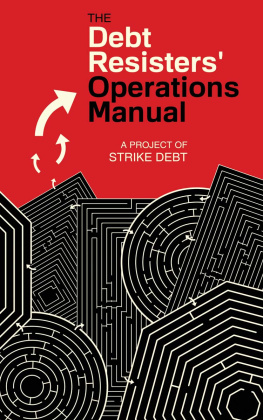Contents
Additional Praise for Endgame
Theres clearly something important going on in the world economy. Something big. Something powerful and dangerous. But something as yet undefined and uncertain. We are all feeling our way around in the dark, trying to figure out what it is. John Mauldin must have night-vision glasses. He does an excellent job of seeing the obstacles. You should read this book before you knock over a lamp and stumble over the furniture.
William Bonner, President and CEO of Agora Inc.; author of Dice Have No Memory and Empire of Debt
Endgame not only is a highly readable and informative account of the causes of the recent global economic and financial meltdown, but it also provides investors with a concrete investment strategy from which they can benefit while this final act in financial history is being played out.
Marc Faber, Managing Director, Marc Faber, Ltd.; Editor , Gloom Boom & Doom Report
I think the book is brilliant. It is well written, crystal clear, and hits the spot. My favorite chapters are the ones on fingers of instability (which I think everyone in finance should read and reread each year lest they forget), and the one on Eastern Europe as both a leading indicator for whats in store and a potential land mine that could yet do for the euro what Credit Anstaldt did for the gold standard. But its a tough call. Lots of very good stuff in here.
Dylan Grice, Global Strategy Team, Societe Generale

Copyright 2011 by John Mauldin and Jonathan Tepper. All rights reserved.
Published by John Wiley & Sons, Inc., Hoboken, New Jersey.
Published simultaneously in Canada.
No part of this publication may be reproduced, stored in a retrieval system, or transmitted in any form or by any means, electronic, mechanical, photocopying, recording, scanning, or otherwise, except as permitted under Section 107 or 108 of the 1976 United States Copyright Act, without either the prior written permission of the Publisher, or authorization through payment of the appropriate per-copy fee to the Copyright Clearance Center, Inc., 222 Rosewood Drive, Danvers, MA 01923, (978) 750-8400, fax (978) 646-8600, or on the Web at www.copyright.com . Requests to the Publisher for permission should be addressed to the Permissions Department, John Wiley & Sons, Inc., 111 River Street, Hoboken, NJ 07030, (201) 748-6011, fax (201) 748-6008, or online at www.wiley.com/go/permission .
Limit of Liability/Disclaimer of Warranty: While the publisher and author have used their best efforts in preparing this book, they make no representations or warranties with respect to the accuracy or completeness of the contents of this book and specifically disclaim any implied warranties of merchantability or fitness for a particular purpose. No warranty may be created or extended by sales representatives or written sales materials. The advice and strategies contained herein may not be suitable for your situation. You should consult with a professional where appropriate. Neither the publisher nor author shall be liable for any loss of profit or any other commercial damages, including but not limited to special, incidental, consequential, or other damages.
For general information on our other products and services or for technical support, please contact our Customer Care Department within the United States at (800) 762-2974, outside the United States at (317) 572-3993 or fax (317) 572-4002.
Wiley also publishes its books in a variety of electronic formats. Some content that appears in print may not be available in electronic formats. For more information about Wiley products, visit our web site at www.wiley.com .
Library of Congress Cataloging-in-Publication Data:
Mauldin, John.
Endgame : the end of the debt supercycle and how it changes everything / John Mauldin and Jonathan Tepper.
p. cm.
Includes index.
ISBN 978-1-118-00457-9 (hardback); ISBN 978-1-118-05806-0 (ebk.);
ISBN 978-1-118-05807-7 (ebk.); ISBN 978-1-118-05808-4 (ebk.)
1. Debt. 2. Debts, Public. 3. Debts, External. 4. Recessions. 5. Business cycles. I. Tepper, Jonathan, 1976 II. Title.
HG3701.M345 2011
336.3'4dc
222010051231
This book is dedicated to Peter Bernstein.
Peter Bernstein 19192009
Amazing author, devoted husband, loving father
Mentor to generations of investment professionals
A man whose wisdom was always welcome
And who saw The Endgame clearly before everyone
You are missed, my friend, now more than ever when your wisdom is most sorely needed.
In order to improve your game, you must study the endgame before everything else, for whereas the endings can be studied and mastered by themselves, the middle game and the opening must be studied in relation to the endgame.
Jose Raul Capablanca, Cuban chess player who was world chess champion from 1921 to 1927 and one of the greatest players of all time
Preface
It is said that the present is pregnant with the future.
Voltaire
Prediction is very difficult, especially about the future.
Niels Bohr
Endgame is a book about the future of the global economy. When we started writing the book in 2010, we were afraid that by the time it arrived in bookstores many of the things we had predicted or warned about would have already happened. Both of your authors had written extensively about the issues and predicted outcomes we discussed in Endgame .
The buildup of debt that caused the financial crisis was still weighing many countries down, and central bankers and governments were responding with unprecedented stimulus. Some countries, such as Greece, were on the verge of defaulting, even though the markets (and European politicians!) were in total denial. We must admit that for us it wasnt rocket science to make the predictions we did, it was simple arithmetic: Greece didnt have enough income to handle its expenses.
As luck would have it, we were able to get Endgame out before Greece defaulted and the worst of the European crisis came to pass. For other countries, like Japan, we were able to warn about the extraordinary measures the Bank of Japan would end up taking. We didnt get everything right, but we were able to provide a very useful roadmap for readers. Endgame was timely, and were pleased to see that it still reads well and offers a good look at the future.
Parts of Endgame are timeless and are intended to provide a fundamental way of viewing the world. In the first part of the book, we looked at the Debt Supercycle and how a very long period of debt buildup in the US, UK, Japan, and Europe would lead to lower growth and a debt-deflationary dynamic. The events of the past few years have borne out that insight. While developed economies appear to be in recovery, it is the most anemic recovery of the past 60 years. Welcome to the New Normal.
Each country faces different challenges and paths ahead. For most countries, the choices are starkbetween bad options and worse ones. Some sadly face a choice between Disaster A and Disaster B. They merely get to choose which path to take in the lead-up to the destruction of their economies, exactly as we wrote about Greece. The worst-off countries of the developed world are still confronted with staggering debt and ageing populations. They are caught in a tug of war between deflation from too much debt and potential inflation from unconventional central bank monetary policies quantitative easing (QE), large-scale asset purchase programs (LSAPs), and currency devaluations. Other countries, particularly in emerging markets, have lower debt levels and higher population growth, but they are facing the spillover of loose money policies from their developed neighbors. They must deal with the fickle tides of capital flows from the developed world, as money pours in and out. As a result, they have gone from being darlings of the investment world to pariahs.
Next page





